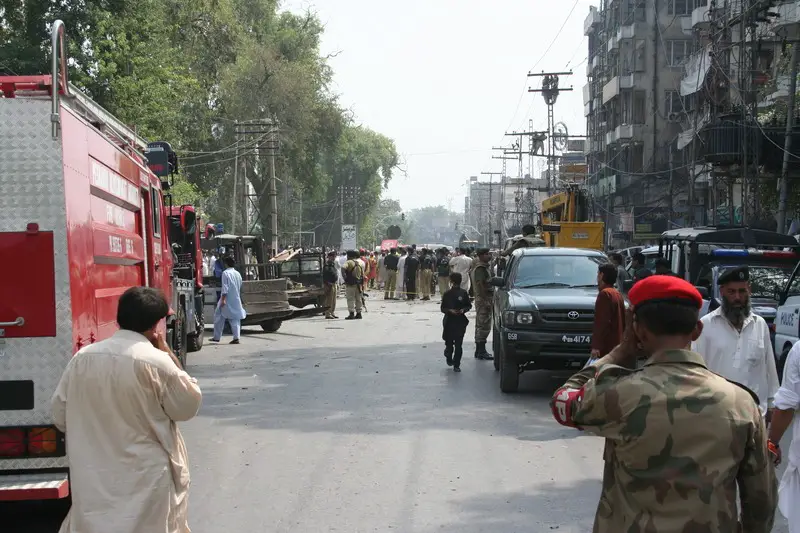A suicide bombing outside a district court in Islamabad killed 12 people and wounded 27 on Tuesday, November 11, 2025, marking one of the most significant attacks on Pakistan’s capital in recent years. The blast occurred at 12:39 p.m. near the gates of the court complex, an area typically crowded with hundreds of visitors attending hearings.
Interior Minister Mohsin Naqvi told journalists at the scene that the attacker tried to enter the court premises but, failing to do so, targeted a police vehicle. The bomber detonated explosives next to the police car after being unable to breach the court’s security perimeter. The casualties were mostly passersby or those who had arrived for court appointments.
A breakaway faction of the Pakistani Taliban, known as Jamaat-ul-Ahrar, initially claimed responsibility for the attack, although the claim was contradicted by one of its commanders. The group, which has staged smaller attacks in previous years, demonstrated its ability to strike at the heart of Pakistan’s capital, raising concerns about the country’s deteriorating security situation.
Following the attack, Pakistani authorities announced a breakthrough on Friday, November 14, 2025, with the arrest of four suspects in connection with the bombing. The men are suspected members of Tehrik-e-Taliban Pakistan, or TTP, which is separate from but closely allied with Afghanistan’s Taliban. The arrests came after a joint operation conducted by Pakistan’s Intelligence Bureau and Counter-Terrorism Department.
One of the suspects, Sajid Ullah, is believed to have handled the bomb used in the suicide attack. According to the government, Ullah told investigators that Saeed-ur-Rehman, a TTP commander also known as Daadullah, ordered the attack through the Telegram messaging app. The commander sent Ullah photographs of the suicide bomber, an Afghanistan citizen from Nangarhar province, with orders to receive him after he crossed the border from Afghanistan into Pakistan.
Ullah arranged accommodation for the attacker near Islamabad and later retrieved an explosive suicide vest from a graveyard in the northwestern city of Peshawar on Daadullah’s instructions before transporting the vest to the capital. The TTP commander, originally from Pakistan’s Bajaur region, is part of the group’s intelligence wing and currently hiding in Afghanistan, according to government officials.
The attack occurred amid escalating tensions between Pakistan and Afghanistan’s Taliban government. Interior Minister Naqvi alleged that Afghan nationals carried out suicide bombings in Islamabad and northwest Pakistan during that week. He further alleged that Indian-backed elements were involved, though he noted authorities were looking into all aspects of the explosion.
Prime Minister Shehbaz Sharif denounced the attacks and called them examples of Indian state terrorism. India rejected these allegations as baseless in a statement issued by government spokesperson Shri Randhir Jaiswal, calling it a predictable tactic by Pakistan to concoct false narratives against India.
Defense Minister Khawaja Mohammad Asif said the country is in a state of war and blamed the Afghan Taliban government for allowing such attacks to occur. The minister warned that Pakistan has the strength to respond fully to the security threats emanating from Afghanistan.
The Islamabad bombing came one day after militants stormed a cadet college in Wana, a city in northwest Pakistan, on Monday, November 10, 2025. The gun battle at the military facility lasted nearly 20 hours, resulting in the deaths of three soldiers and all the attackers. These coordinated attacks underscore Pakistan’s increasingly fraught security situation and the challenges posed by militant groups operating along its borders.
Tensions between Pakistan and Afghanistan have risen sharply in recent months. Cross-border fighting in October killed dozens of soldiers, civilians and militants before Qatar brokered a ceasefire on October 19, 2025, which remains in place. Since then, two rounds of peace talks have been held in Istanbul, with the most recent occurring on Thursday, November 7, 2025.
However, the talks ended without agreement after Kabul refused to provide a written assurance that TTP and other militant groups would not use Afghan territory against Pakistan. This failure to reach a diplomatic solution has left the ceasefire fragile and the security situation precarious.
Foreign Ministry spokesperson Tahir Andrabi thanked Qatar and Turkey for facilitating Pakistan’s talks with Afghanistan and said Islamabad remained committed to resolving issues with Kabul through dialogue. He noted that despite positive gestures from Pakistan, including bilateral trade assistance and humanitarian aid, the response from Afghanistan’s Taliban government has only been hollow promises and inaction.
The security challenges facing Pakistan extend beyond the TTP threat. The country has seen a surge in militant attacks in recent years, with the capital previously considered safer than the country’s northwest region, which has suffered from repeated violence. The ability of militant groups to carry out sophisticated attacks in Islamabad signals an escalation in the security crisis facing the nation.
An earlier brief ceasefire between Pakistan and TTP, brokered by Kabul in 2022, collapsed after the group accused Islamabad of violating it. The United States and the United Nations have designated TTP as a terrorist organization, and Pakistan has outlawed the group.
The arrest of the four suspects represents a significant development in the investigation, but questions remain about the broader security implications and whether diplomatic efforts can prevent future attacks. The discovery that the bomber came from Afghanistan and that the TTP commander operates from Afghan territory continues to fuel tensions between the two neighboring countries, complicating efforts to achieve lasting stability in the region.











